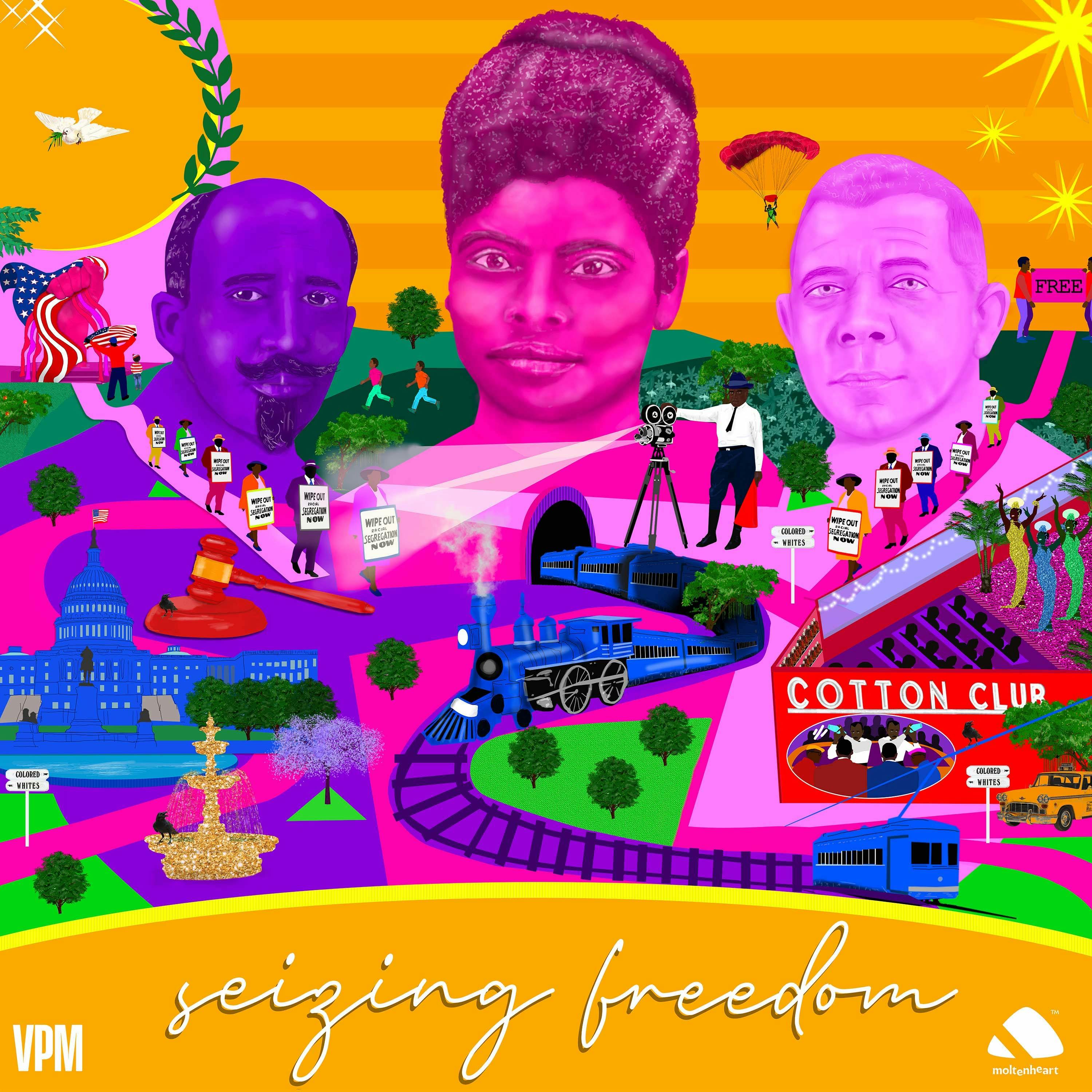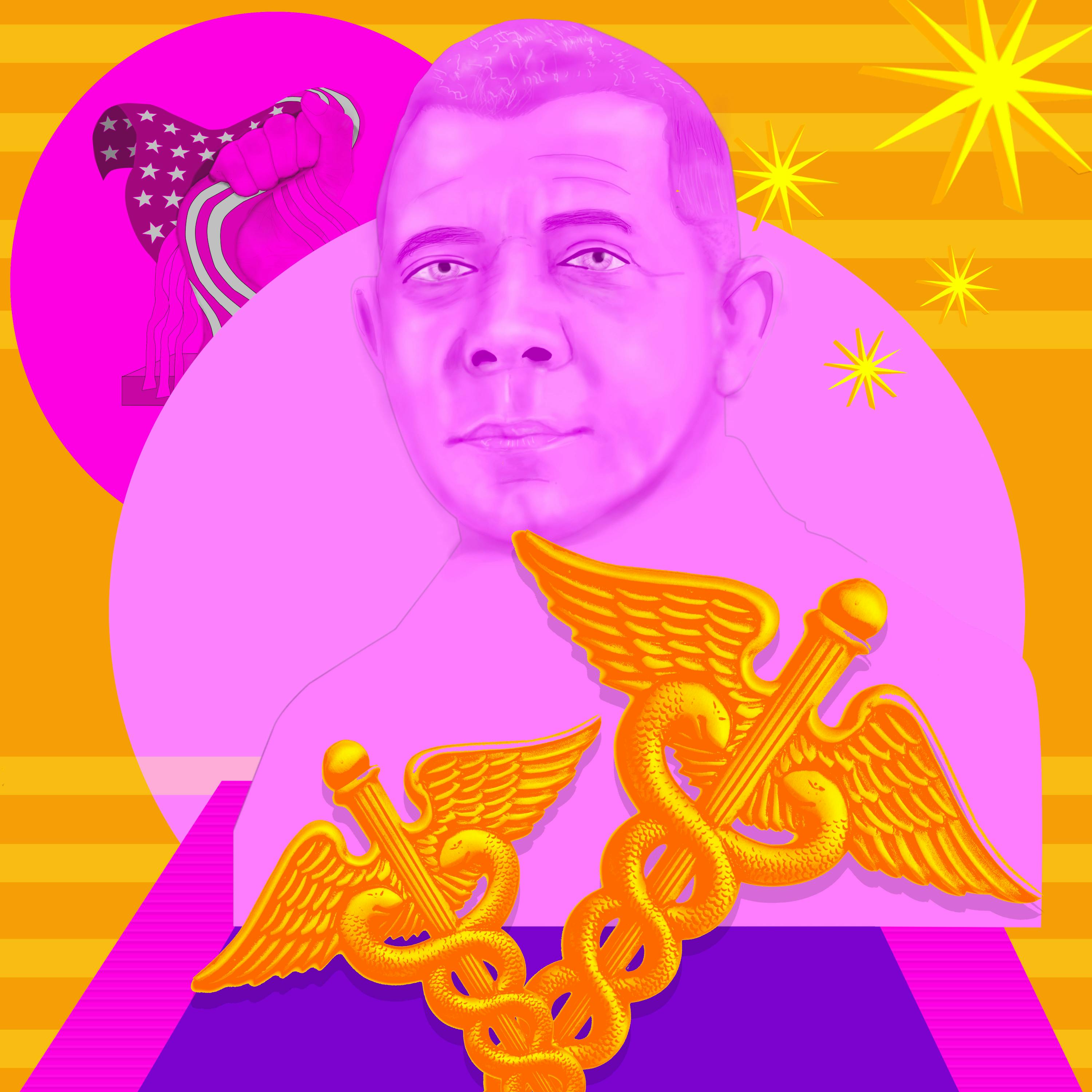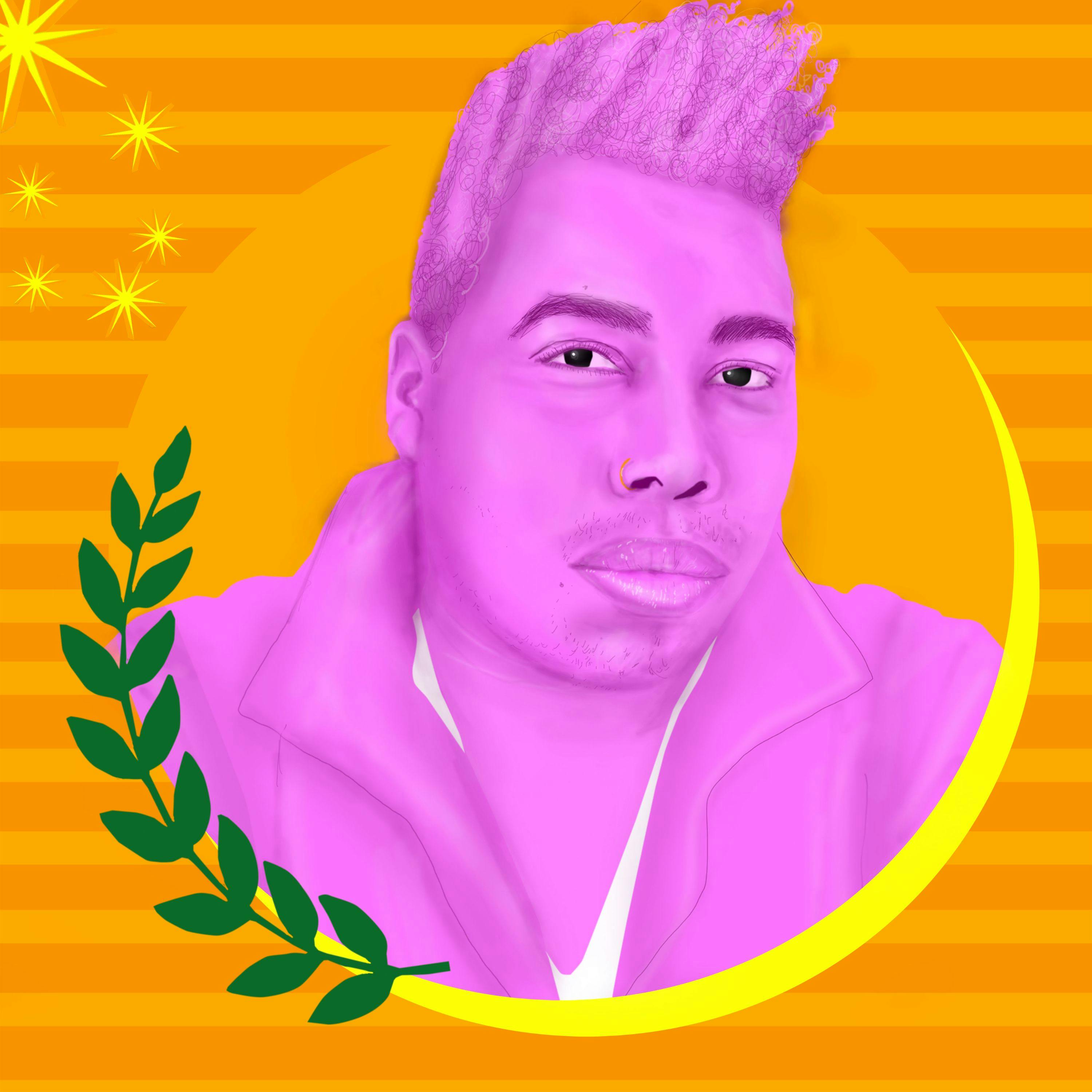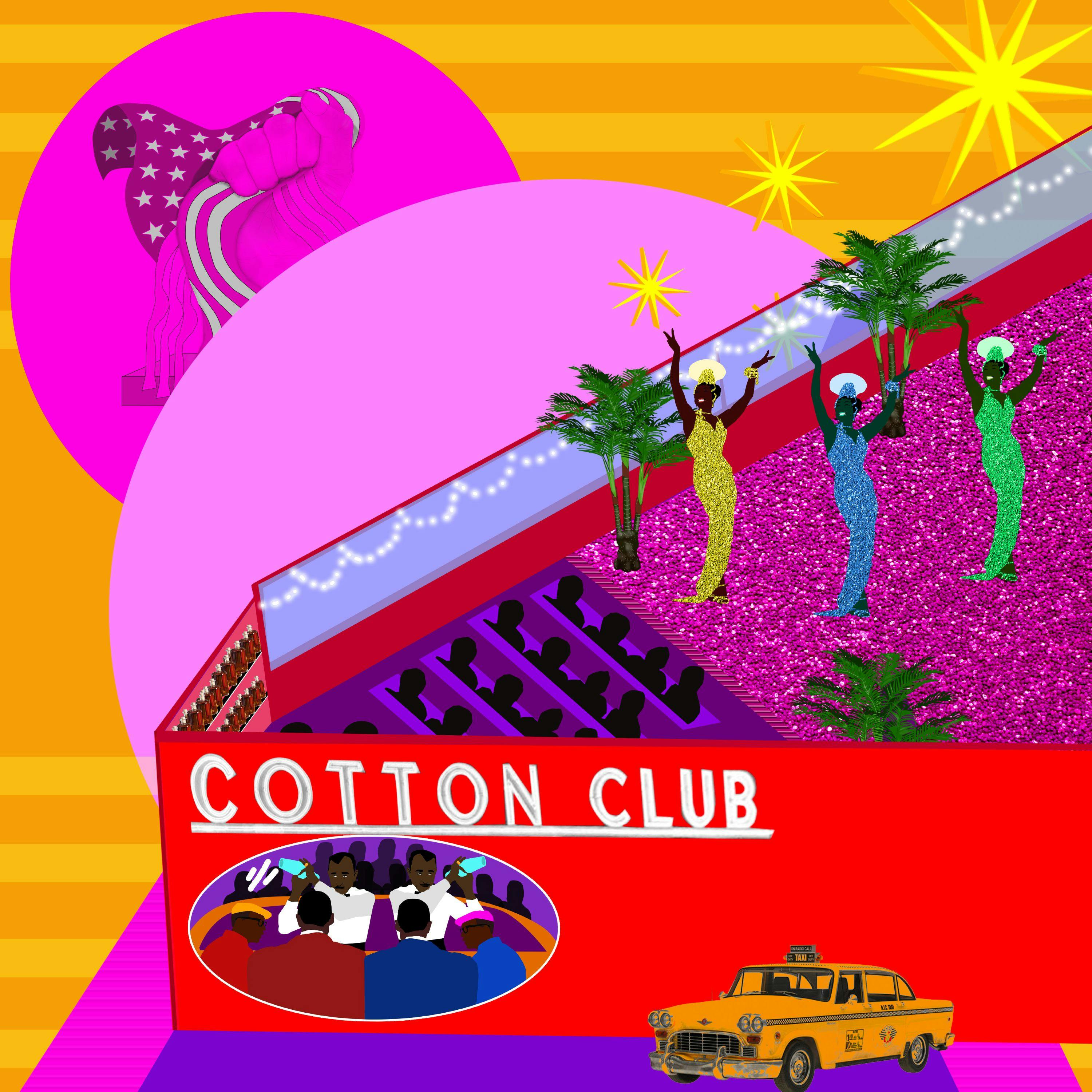Shows
 Seizing FreedomInterview - Mariame KabaSeason 2 Finale. Kidada speaks with activist and organizer Mariame Kaba about the ways many of us practice abolition without realizing it, how ordinary people have the power to collectively free themselves, and why safety can only be found through community. They discuss how the prison industrial complex and the systems it encompasses do more harm than good and identify solutions that address the underlying causes of criminalized activity and provide the resources and support needed for everyone to thrive.Additionally, they touch on the power of public libraries to o...2022-05-1743 min
Seizing FreedomInterview - Mariame KabaSeason 2 Finale. Kidada speaks with activist and organizer Mariame Kaba about the ways many of us practice abolition without realizing it, how ordinary people have the power to collectively free themselves, and why safety can only be found through community. They discuss how the prison industrial complex and the systems it encompasses do more harm than good and identify solutions that address the underlying causes of criminalized activity and provide the resources and support needed for everyone to thrive.Additionally, they touch on the power of public libraries to o...2022-05-1743 min Seizing FreedomReframing the Narrative?African Americans couldn’t seize much universal freedom as the brick-and-mortar of Jim Crow walled them off from their rights. Still, race men and women fought.Following the death of three friends, instigated by the white press, Ida B. Wells committed herself to investigating and reporting the evils of lynching across the south, starting a newspaper in Memphis, Tennessee. It wasn’t long before her printing press was burned to the ground and she was forced to relocate to Chicago. The windy city was witnessing the rise of Black Holly...2022-05-1053 min
Seizing FreedomReframing the Narrative?African Americans couldn’t seize much universal freedom as the brick-and-mortar of Jim Crow walled them off from their rights. Still, race men and women fought.Following the death of three friends, instigated by the white press, Ida B. Wells committed herself to investigating and reporting the evils of lynching across the south, starting a newspaper in Memphis, Tennessee. It wasn’t long before her printing press was burned to the ground and she was forced to relocate to Chicago. The windy city was witnessing the rise of Black Holly...2022-05-1053 min Seizing FreedomInterview - Julia CravenKidada speaks with health reporter Julia Craven about health and wellness for African Americans, both historically and in the context of the COVID-19 pandemic. They explore how health outcomes are influenced by systemic forces and not purely the result of the personal decisions people make on a daily basis, as well as the responsibilities of individuals to make an impact within the larger framework of public health.They also touch on the relationship between capitalism and mental health, and how that is a contributing factor to the recent Great R...2022-05-0336 min
Seizing FreedomInterview - Julia CravenKidada speaks with health reporter Julia Craven about health and wellness for African Americans, both historically and in the context of the COVID-19 pandemic. They explore how health outcomes are influenced by systemic forces and not purely the result of the personal decisions people make on a daily basis, as well as the responsibilities of individuals to make an impact within the larger framework of public health.They also touch on the relationship between capitalism and mental health, and how that is a contributing factor to the recent Great R...2022-05-0336 min Seizing FreedomDethroning DiseaseAttendees of the 1914 “Fifty Years of Negro Health Improvement in Preparation for Efficiency” conference, with speakers including Booker T. Washington, heard staggering information about the Black population’s “health”, which was in crisis. Life expectancy for African Americans at the time was about 35 years. African Americans rallied public health professionals to confront disease. They understood how poor health outcomes endangered their collective destiny and compromised their ability to fight for full equality. They knew that illness, disease, and lack of means and systems to treat them compromised freedom. Clean communities...2022-04-2650 min
Seizing FreedomDethroning DiseaseAttendees of the 1914 “Fifty Years of Negro Health Improvement in Preparation for Efficiency” conference, with speakers including Booker T. Washington, heard staggering information about the Black population’s “health”, which was in crisis. Life expectancy for African Americans at the time was about 35 years. African Americans rallied public health professionals to confront disease. They understood how poor health outcomes endangered their collective destiny and compromised their ability to fight for full equality. They knew that illness, disease, and lack of means and systems to treat them compromised freedom. Clean communities...2022-04-2650 min Seizing FreedomInterview - Saeed JonesKidada speaks with writer, poet and social commentator Saeed Jones about the many facets of Black masculinity, how it has been shaped and reshaped over the years, and the challenges that have arisen around cultural expectations for the type of Black man you should be in order to be a credit to the race.They dig into the role of white supremacy in establishing and upholding these cultural norms and discuss how the system is operating and iterating and wreaking havoc even without active involvement from white people. They a...2022-04-1938 min
Seizing FreedomInterview - Saeed JonesKidada speaks with writer, poet and social commentator Saeed Jones about the many facets of Black masculinity, how it has been shaped and reshaped over the years, and the challenges that have arisen around cultural expectations for the type of Black man you should be in order to be a credit to the race.They dig into the role of white supremacy in establishing and upholding these cultural norms and discuss how the system is operating and iterating and wreaking havoc even without active involvement from white people. They a...2022-04-1938 min Seizing FreedomInside Harlem's SpeakeasiesBlack workers were expected to take on “respectable” employment in the early twentieth century, essentially a racist dog whistle to keep them in the dirtiest, most dangerous and low-paying jobs. While some Black people had the means to reject these types of jobs, most couldn’t afford to. But power was there to be seized if you were willing to break the rules of respectability. In the “Negro metropolis” of Harlem, a complicated world developed in the shadows, one where Black men played by a different set of rules to claim freedom no matter the cost. 2022-04-1239 min
Seizing FreedomInside Harlem's SpeakeasiesBlack workers were expected to take on “respectable” employment in the early twentieth century, essentially a racist dog whistle to keep them in the dirtiest, most dangerous and low-paying jobs. While some Black people had the means to reject these types of jobs, most couldn’t afford to. But power was there to be seized if you were willing to break the rules of respectability. In the “Negro metropolis” of Harlem, a complicated world developed in the shadows, one where Black men played by a different set of rules to claim freedom no matter the cost. 2022-04-1239 min Seizing FreedomInterview - Jamelle BouieKidada speaks with New York Times columnist Jamelle Bouie about the legacies of discriminatory housing policies in the United States and their impact, primarily on Black and other marginalized communities, from the beginning of the nation to today, as well as how they might be addressed in the future.They examine the differences in how that discrimination manifests explicitly and implicitly, as well as the roles both institutions and individuals play in contributing to these housing problems.They also discuss ways in which federal and local governments can play a positive role in expanding the...2022-04-0535 min
Seizing FreedomInterview - Jamelle BouieKidada speaks with New York Times columnist Jamelle Bouie about the legacies of discriminatory housing policies in the United States and their impact, primarily on Black and other marginalized communities, from the beginning of the nation to today, as well as how they might be addressed in the future.They examine the differences in how that discrimination manifests explicitly and implicitly, as well as the roles both institutions and individuals play in contributing to these housing problems.They also discuss ways in which federal and local governments can play a positive role in expanding the...2022-04-0535 min Seizing FreedomThe Land of Milk and HoneyIn the late 19th and early 20th centuries, several million African Americans left the South for the North and West. They wanted to raise their kids in a place where they could live and work undisturbed by violence and out from under a racist social order. And California was advertised as the land of milk and honey.But, contrary to what they had been sold, Black migrants to California—like Verna Deckard and her family, who left Texas for Los Angeles in the 1920s—had to fight to live and to play. They faced segregation in public spac...2022-03-2947 min
Seizing FreedomThe Land of Milk and HoneyIn the late 19th and early 20th centuries, several million African Americans left the South for the North and West. They wanted to raise their kids in a place where they could live and work undisturbed by violence and out from under a racist social order. And California was advertised as the land of milk and honey.But, contrary to what they had been sold, Black migrants to California—like Verna Deckard and her family, who left Texas for Los Angeles in the 1920s—had to fight to live and to play. They faced segregation in public spac...2022-03-2947 min Seizing FreedomInterview - Paula AustinKidada speaks with historian Paula Austin about the shift in American society to protect childhood innocence in the early 1900s, and how that concept doesn’t apply to—or help us understand—the experiences of Black children who grew up during the early days of Jim Crow. Despite only white children being recognized as “properly innocent” and deserving of protection, Paula shares that Black children generally had a strong sense of self and were proud of their community and history. They also look to survey responses from Black youth in the nation’s capital in the 1930s to r...2022-03-2230 min
Seizing FreedomInterview - Paula AustinKidada speaks with historian Paula Austin about the shift in American society to protect childhood innocence in the early 1900s, and how that concept doesn’t apply to—or help us understand—the experiences of Black children who grew up during the early days of Jim Crow. Despite only white children being recognized as “properly innocent” and deserving of protection, Paula shares that Black children generally had a strong sense of self and were proud of their community and history. They also look to survey responses from Black youth in the nation’s capital in the 1930s to r...2022-03-2230 min Seizing FreedomChildren of the SunMany Black Americans at the end of the nineteenth century relied heavily on themselves, prioritizing self-determination and securing their collective destiny through solidarity, self-help, and economic independence. But blatant racism saturated media, entertainment, and education. Parents pushed for less harmful representation of Black life for their children, resulting in the creation of lifelike dolls and print media focused on chasing away the shadows of white supremacy with the light of Black love, consciousness, and possibility.The lessons Black children learned from their parents and surrounding adults empowered them to g...2022-03-1544 min
Seizing FreedomChildren of the SunMany Black Americans at the end of the nineteenth century relied heavily on themselves, prioritizing self-determination and securing their collective destiny through solidarity, self-help, and economic independence. But blatant racism saturated media, entertainment, and education. Parents pushed for less harmful representation of Black life for their children, resulting in the creation of lifelike dolls and print media focused on chasing away the shadows of white supremacy with the light of Black love, consciousness, and possibility.The lessons Black children learned from their parents and surrounding adults empowered them to g...2022-03-1544 min Seizing FreedomInterview - Blair L.M. KelleyKidada speaks with historian Blair L.M. Kelley about how segregation grew out of pushback against Black upward mobility, and how Richmond, VA serves as an example of how boycotts can be a powerful tool for collective success to combat issues of justice following the streetcar boycotts in the city at the turn of the 20th century.They also discuss the role failure plays in laying the groundwork for future successes in social justice movements, encouraging current activists to look to history for examples of how to continue the fight even in the face of defeat. ...2022-03-0834 min
Seizing FreedomInterview - Blair L.M. KelleyKidada speaks with historian Blair L.M. Kelley about how segregation grew out of pushback against Black upward mobility, and how Richmond, VA serves as an example of how boycotts can be a powerful tool for collective success to combat issues of justice following the streetcar boycotts in the city at the turn of the 20th century.They also discuss the role failure plays in laying the groundwork for future successes in social justice movements, encouraging current activists to look to history for examples of how to continue the fight even in the face of defeat. ...2022-03-0834 min Seizing FreedomWalk! The Streetcar BoycottsWith white supremacist strategies for segregated societies solidifying in towns across America’s South, Black people needed to respond in ways that would ensure the freedoms their predecessors had fought to codify into law remained available to them. Between 1900 and 1910, in more than two dozen cities, African Americans tried to stem the tide of their exclusion from public life by taking the fight to the streets, boycotting streetcars that divided Black and white passengers.The pressure applied by these protests wasn’t successful in every instance, but the victories that were won inspired continued activism and p...2022-03-0143 min
Seizing FreedomWalk! The Streetcar BoycottsWith white supremacist strategies for segregated societies solidifying in towns across America’s South, Black people needed to respond in ways that would ensure the freedoms their predecessors had fought to codify into law remained available to them. Between 1900 and 1910, in more than two dozen cities, African Americans tried to stem the tide of their exclusion from public life by taking the fight to the streets, boycotting streetcars that divided Black and white passengers.The pressure applied by these protests wasn’t successful in every instance, but the victories that were won inspired continued activism and p...2022-03-0143 min Seizing FreedomInterview - Kinshasha Holman Conwill & Paul GardulloKidada speaks with Kinshasha Holman Conwill, the deputy director of the Smithsonian’s National Museum of African American History and Culture; as well as writer, historian and curator at the Smithsonian’s National Museum of African American History and Culture, Paul Gardullo.They reflect on The World’s Fair in Paris in 1900 and how they would curate a similar display of progress in 2022, alongside a discussion of the transformative power of museum exhibits, generally, and the value of African American exhibits, specifically. Additionally, they share what the recent backlash against the teaching of Black history means f...2022-02-2245 min
Seizing FreedomInterview - Kinshasha Holman Conwill & Paul GardulloKidada speaks with Kinshasha Holman Conwill, the deputy director of the Smithsonian’s National Museum of African American History and Culture; as well as writer, historian and curator at the Smithsonian’s National Museum of African American History and Culture, Paul Gardullo.They reflect on The World’s Fair in Paris in 1900 and how they would curate a similar display of progress in 2022, alongside a discussion of the transformative power of museum exhibits, generally, and the value of African American exhibits, specifically. Additionally, they share what the recent backlash against the teaching of Black history means f...2022-02-2245 min Seizing FreedomOn The World's StageThe 1893 World’s Fair in Chicago was an opportunity for the United States to showcase its spectacular growth and signal its arrival as a world power, but it failed to highlight Black Americans’ role in its development, and they took notice. So when Paris hosted the Exposition Universelle in 1900, African Americans knew creating space to showcase their progress to the world was of major importance. Among the exhibition’s attendees was W.E.B. Du Bois. He seized the opportunity to present factual evidence of Black achievement to dispel international stereotypes and convince world powers to apply...2022-02-1544 min
Seizing FreedomOn The World's StageThe 1893 World’s Fair in Chicago was an opportunity for the United States to showcase its spectacular growth and signal its arrival as a world power, but it failed to highlight Black Americans’ role in its development, and they took notice. So when Paris hosted the Exposition Universelle in 1900, African Americans knew creating space to showcase their progress to the world was of major importance. Among the exhibition’s attendees was W.E.B. Du Bois. He seized the opportunity to present factual evidence of Black achievement to dispel international stereotypes and convince world powers to apply...2022-02-1544 min Seizing FreedomInterview - Adam SerwerKidada speaks with Adam Serwer, staff writer at The Atlantic who covers race, politics and justice, about the role of the Black press in America, both historically and in the present. They look at how conspiracy theories, misinformation and slander have been used as a form of media propaganda since the formation of the Ku Klux Klan, and how pioneering journalists like Ida B. Wells-Barnett laid the groundwork for identifying and calling out these campaigns. Additionally, they discuss the evolution of legacy media outlets over time to include more diverse voices, and what it means to t...2022-02-0833 min
Seizing FreedomInterview - Adam SerwerKidada speaks with Adam Serwer, staff writer at The Atlantic who covers race, politics and justice, about the role of the Black press in America, both historically and in the present. They look at how conspiracy theories, misinformation and slander have been used as a form of media propaganda since the formation of the Ku Klux Klan, and how pioneering journalists like Ida B. Wells-Barnett laid the groundwork for identifying and calling out these campaigns. Additionally, they discuss the evolution of legacy media outlets over time to include more diverse voices, and what it means to t...2022-02-0833 min Seizing FreedomThe Fight of the CenturyBlack southerners and their allies were experiencing the brick and mortar of Jim Crow being installed in real time. Racial terror killings had been climbing, lynchings were becoming more shocking and segregation was gaining traction.And through all this, Black people were still fighting to find a strategy for surviving the afterlife of slavery so they could achieve the Promised Land of their ancestors’ dreams. Black people had to decide what that strategy was going to be for them and for Black folk beyond their lifetimes. And they were not always in agreement.Conservatives like Bo...2022-02-0146 min
Seizing FreedomThe Fight of the CenturyBlack southerners and their allies were experiencing the brick and mortar of Jim Crow being installed in real time. Racial terror killings had been climbing, lynchings were becoming more shocking and segregation was gaining traction.And through all this, Black people were still fighting to find a strategy for surviving the afterlife of slavery so they could achieve the Promised Land of their ancestors’ dreams. Black people had to decide what that strategy was going to be for them and for Black folk beyond their lifetimes. And they were not always in agreement.Conservatives like Bo...2022-02-0146 min Subject Thread PodcastCreative Expression Of Art With Lyne Lucien S 2 E 27Creative Expression Of Artsound mood: Killing Me Softly The Fugees What started out as a thought-provoking art piece "Trump World" opened the door to a much-needed conversation for artist Lyne Lucien a native of Hatti and her art reflects that throughout her pieces. Not only are they an expression of black culture in its beauty and well-needed form, but they are also so needed in the art culture. Lyne has the ability to diversify her art she leaves no one behind in her vision. Lyne Lucien...2021-04-0231 min
Subject Thread PodcastCreative Expression Of Art With Lyne Lucien S 2 E 27Creative Expression Of Artsound mood: Killing Me Softly The Fugees What started out as a thought-provoking art piece "Trump World" opened the door to a much-needed conversation for artist Lyne Lucien a native of Hatti and her art reflects that throughout her pieces. Not only are they an expression of black culture in its beauty and well-needed form, but they are also so needed in the art culture. Lyne has the ability to diversify her art she leaves no one behind in her vision. Lyne Lucien...2021-04-0231 min Between the CrimesEpisode 14: Skylar Neese / Issei Sagawa*WARNING: VERY GRAPHIC EPISODE*Happy Thanksgiving everyone!What better day to release a new episode of Between the Crimes! Just in time for you all to settle down, spend time with family & friends, and get ready for a nice warm meal.Interestingly enough, we have a very special episode for you today. Brace yourself, this is one of the most graphic and disgusting true crime stories we have ever shared here on this podcast. The faint of heart should not listen to this episode, particularly part two -- and the squeamish should absolutely...2020-11-261h 30
Between the CrimesEpisode 14: Skylar Neese / Issei Sagawa*WARNING: VERY GRAPHIC EPISODE*Happy Thanksgiving everyone!What better day to release a new episode of Between the Crimes! Just in time for you all to settle down, spend time with family & friends, and get ready for a nice warm meal.Interestingly enough, we have a very special episode for you today. Brace yourself, this is one of the most graphic and disgusting true crime stories we have ever shared here on this podcast. The faint of heart should not listen to this episode, particularly part two -- and the squeamish should absolutely...2020-11-261h 30 She's All Over the PlaceBreonna Taylor Justice Will Be Served The Emmys & the Social DilemmaFirst Day of Autumn New single release today! Breonna Taylor Justice Will Be Served with healing frequencies in collaboration with Subtle Energy 639 Hz - 639 Hz fosters forgiveness, peace, and love in the relationships as well as stimulates the higher heart chakra. 639 Hz re-connects and rebalances your relationships. The Social Dilemma, the Emmys, this episode is dedicated to Breonna Taylor and her mother Tanika Palmer. Art Credits: Breonna Taylor’s mother @tamikalpalmer, Neon Pink CAJ. @newyorkermag @carolitajohnson, Mural by @winkart501 via littlerock_streetcult, Opinion illustration by Lyne Lucien/Getty @thedailybeast via @iamsophianelson Music by The Sophisticated Psych...2020-09-2220 min
She's All Over the PlaceBreonna Taylor Justice Will Be Served The Emmys & the Social DilemmaFirst Day of Autumn New single release today! Breonna Taylor Justice Will Be Served with healing frequencies in collaboration with Subtle Energy 639 Hz - 639 Hz fosters forgiveness, peace, and love in the relationships as well as stimulates the higher heart chakra. 639 Hz re-connects and rebalances your relationships. The Social Dilemma, the Emmys, this episode is dedicated to Breonna Taylor and her mother Tanika Palmer. Art Credits: Breonna Taylor’s mother @tamikalpalmer, Neon Pink CAJ. @newyorkermag @carolitajohnson, Mural by @winkart501 via littlerock_streetcult, Opinion illustration by Lyne Lucien/Getty @thedailybeast via @iamsophianelson Music by The Sophisticated Psych...2020-09-2220 min